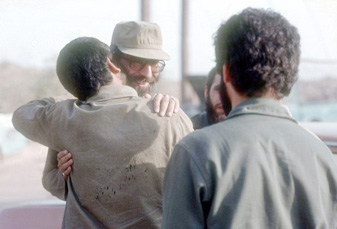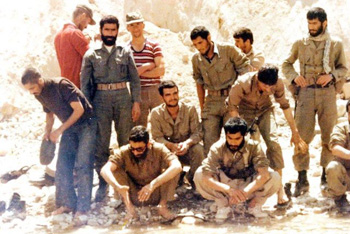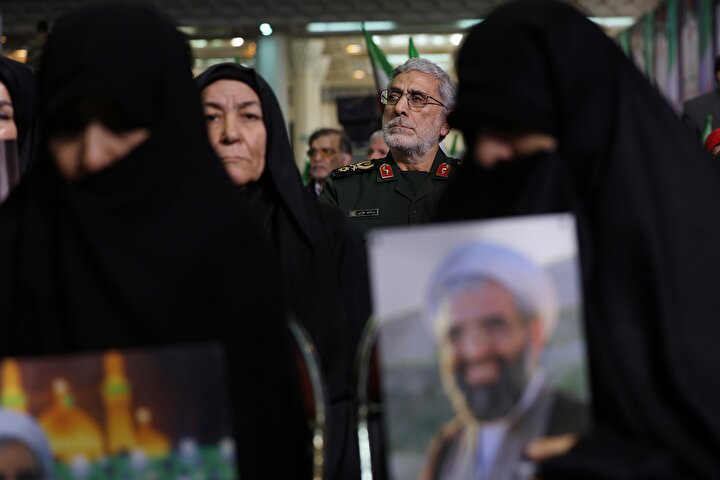US soldiers cannot claim they are fighting for their country: Ayatollah Khamenei

September 22 (Shahrivar 31st on the Iranian calendar)--the day when barbaric dictator Saddam Hussein sent his regime to invade Iran in 1980--marks the beginning of Sacred Defense Week in Iran. For this event Khamenei.Ir publishes statements by Ayatollah Khamenei, he explains how the Islamic Republic emerged from the Iran-Iraq war completely victorious.
As
for the issue of war, first, this war was a defensive one. There are two major
differences between a defensive and an offensive war in terms of meaning and
content. One difference is that an offensive war is based on transgression and
aggression, but this is not the case with a defensive war. The second
difference is that a defensive war is a place where zeal, courage and deep
loyalty to ideals emerge.
These ideals may be related to one's country or more important than that, one's religion, belief and Islam. This does not exist in an offensive war. For example, when America attacks Iraq, an American soldier cannot claim that he is doing it for the love of his country. What does Iraq have to do with his country? This war is at the service of other goals, but if an Iraqi person resists this military invasion and presence inside his country, this means showing resistance and defending one's country, national identity and those values that one believes in. These two differences exist between a defensive and offensive war.
Our war was a defensive war. The people of Iran showed that they were not willing to invade and to transgress. Rather, they showed that when it comes to defending national identity and those ideals which are even dearer than national identity, their resistance is an instructive resistance. The resistance that the people of Iran showed was not an ordinary one, rather it was a kind of resistance that can be considered as a model and a lesson for other peoples. And it was considered to be so during the Sacred Defense Era. The Palestinians said to us, "We learned from you". The people of Lebanon too repeatedly said to us that they learned from us in the course of these years. Those peoples who were not Muslim and who became Muslim later on or those peoples who were Muslim, but who became followers of the Holy Prophet's (s.w.a.) household said over and over again that they learned from our war, our defense and our resistance and that they became sure about our sincerity. The Sacred Defense Era was really such an era and the Sacred Defense contained such concepts. This is one part of our approach about the Sacred Defense and its concepts.

Another part is about the event that happened during the Sacred Defense Era. What was that event? Sometimes, a war breaks out between two countries - between two neighboring or non-neighboring countries. This is one possibility. Another possibility is the formation of a tacit, announced and sometimes unannounced union between all global powers - the current powers in the world - against one area and center. These two are different from each other. The first war is different from the second one. Our war was of the second kind. That is to say, all centers of global power - including military, political, financial, security and other such kinds of power - poured onto Iran in a united way. It was a battle of armies and groups in the real sense of the word. All powerful parties, gangs and groups poured onto Iran. Why did they do that? There is a political analysis for this. For any reason, they attacked our country. Despite all their differences, the Soviet Union and America cooperated in this event. The trenches and pentagonal structures that the gentlemen referred to in the meeting were Soviet tactics and they gave them to the Iraqis. You who are familiar with war tactics know these things. All sorts of western and eastern airplanes, missiles, artillery, tanks and ammunitions were used against us by the ba'athist regime of Iraq and everyone helped it in doing so.
After the war came to an end - I think it was in late 1367(1988-1989)- I and other officials went on a trip to the former Yugoslavia which broke up later on and which was one of the important centers of supporting Iraq in those days. At tht time, I was the president. After a long and detailed discussion, they did not even agree to sell us their tanks. This was while all sorts of eastern and western tanks were transferred to Iraq whenever the Iraqis were short in the front lines. Whenever one of their tanks was damaged, they would not wait. They would bring a crane and they would throw it into a wetland or river. This way, they got rid of it and it did not matter to them at all. This was while our soldiers would find these tanks with great trouble and they would patch them up and use them. This means that all military equipment and all sorts of ammunitions and weapons - ranging from tactics and space information to all kinds of back up including money, political support and the like - were in the hands of one side, namely the ba'athist regime. All these resources were available to them. And the other side, the Islamic Republic, was alone in the real sense of the word. This is one aspect of the war.
Another aspect of the war was the way it came to an end. With nonsensical statements and weak arguments, some people created falsehoods in the mind of vulnerable people and those who are prepared to accept such falsehoods. Who can doubt that in the eight-year Sacred Defense Era, the Islamic Republic emerged completely victorious? There is no room for doubt about this at all. As I described, a regime entered a country with a well-equipped and well-prepared army in order to overthrow the government of this country and dissect it. It occupied part of this country and everyone in the world helped it in doing so. It continued to exert pressures for eight years and in the end, it was forced to leave this country empty-handed. This was while the number of its casualties, wounded soldiers and captives was larger than the defending country. The defending country made many achievements in different areas during the war. But the aggressor has been fed by others and it has fallen from the favor of those powers which used to support it. Moreover, no piece of land remains in its hands. So, who achieved victory in this war? Who suffered a defeat? Is there any room for doubt about this matter? The end of the war is one of the important areas of the war and it is a source of pride for us.
source: Statements made in a meeting with Soldiers and Commanders of the Sacred Defense Era / khamenei.ir




